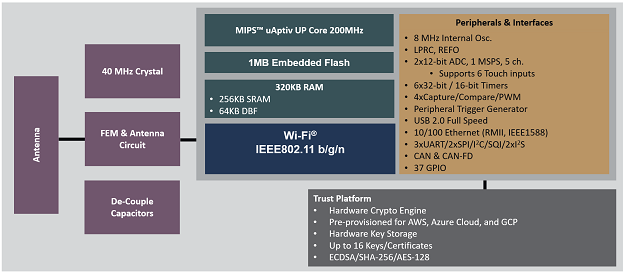2 Getting started with PIC32MZ-W1 / WFI32E0x
The PIC32MZ W1 Family is a smart 32-bit microcontroller which offer Wi-Fi 4* connectivity and hardware-based security accelerator in a single device solution. No need for external MCU, thus it offers the ability to add your own application with generous amount of memory (1MB Flash, 256kB SRAM).
The family is composed of a SoC and Modules:
PIC32MZ1025W104 SoC
132-pin DQFN 10 x 10 x 0.9 mm
SoC with 32-bit Embedded MCU with Wi-Fi network Connectivity and Security Accelerator
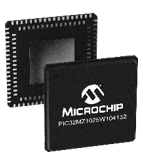
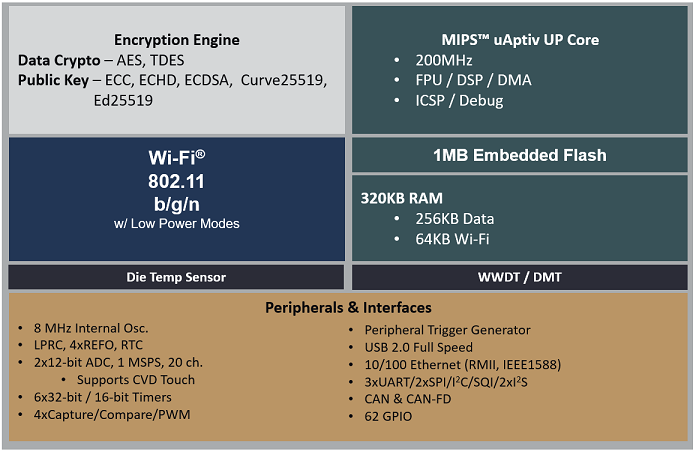
WFI32E01 Certified Modules
Based on the SoC, the 54-pin SMD 24.5 x 20.5 x 2.5 mm module comes with different flavors
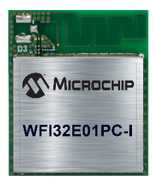
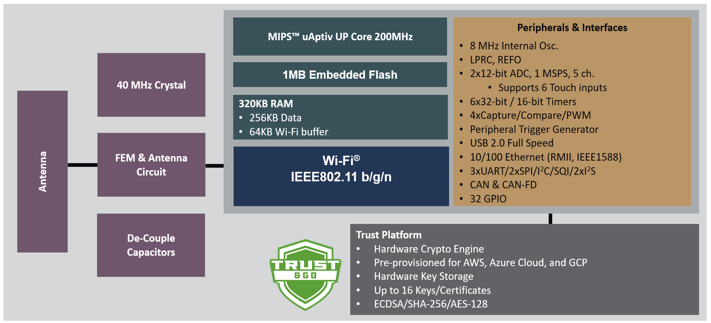
WFI32E01PE, with FEM and PCB antenna integrated
WFI32E01PC, with FEM and PCB antenna integrated and Trust&Go Secure Element on board
WFI32E01UE, with FEM and uFL connector for external antenna
WFI32E01UC, with FEM and uFL connector for external antenna and Trust&Go Secure Element on board
The modules are compliant to Wi-Fi Alliance (WFA) specification and certified with the following world regulatory agencies: Federal Communications Commission (FCC), Industry Canada (IC) and European Radio Equipment Directive (RED). More certification to come later.
Check out the datasheet for more information.
Smart MCU
The PIC32MZW1 share the same core and same peripherals as the PIC32MZ2048EF device; part of PIC32MZ-EF Family
The PIC32MZW1 Solution offers a fast 200 MHz and highly efficient microcontroller.
CoreMark score of 710 (EEMBC) benchmark for MCU core performance

A large number of GPIOs is free-to-use (Module: 37 I/Os, SoC: 62 I/Os).
In addition to Wi-Fi connectivity, a rich set of peripherals is available such as: Ethernet MAC (10-100 RMII), CAN/CAN-FD, USB 2.0 (Full-Speed 12Mbps OTG) and CVD Touch.

It offers premium analog performance with fast 2Msps sampling frequency, accurate 12-bit and highly linear ADC readings with minimum effect coming from temperature variation.
It is supported with a leading Integrated Development Environment: MPLAB® X IDE and a fully integrated embedded software development framework: MPLAB® Harmony 3.
Radio performance
The WFI32E01 module incorporates a high quality RF-FEM. This helps provide industry leading radio performance offering end products, using the module, increased range and improved RF performance. This also helps reduce power consumption, improve end user experience and reduce Wi-Fi latency as able to maintain Wi-Fi 4, MCS-7 capability.
Check out the Transmitter Performance Characteristics Section in the datasheet for more information.
High level of Security
The device embeds an asymmetric crypto engine which provide hardware acceleration to support Public Key cryptography functions, needed during authentication and key negotiation sessions.
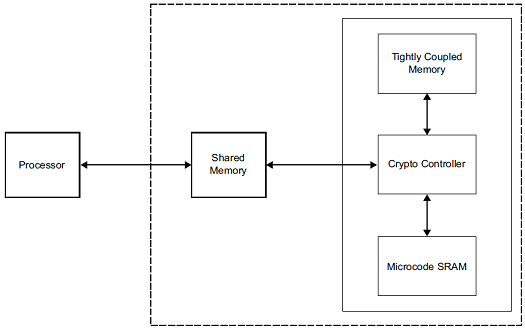
In addition, it comes with a symmetric crypto engine in order to accelerate applications that need cryptographic functions.
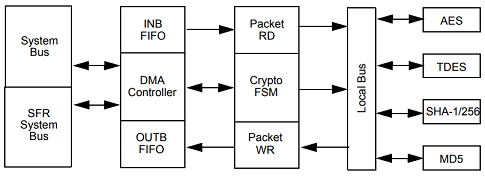
Symmetric Crypto Engine includes four different cryptographic security engines designed to accelerate the computation of public/private key pair negotiations, message hash authentication and bulk data encryption/decryption. Able to operate in parallel or daisy-chained to execute more sophisticated security methods, the Crypto Engine includes engines for AES, Data Encryption Standard (DES) and Triple DES (TDES), Secure Hash Algorithm (SHA-1 and SHA-256) and Message Digest 5 (MD5). Built into the MCU, the Crypto Engine includes a DMA controller for scatter/gather data fetching and an intelligent state machine to schedule the individual security engines independently of the PIC32MZW1's primary CPU.
Check out the datasheet to get the details of the algorithms supported.

There is no secure key storage mechanism on the SoC, this can be provided using an ATECC608 Secure Element. The modules WFI32E01PC and WFI32E01UC come with on-board ATECC608 Secure Element or one can be fitted external to the module. This integrates well with the WolfSSL TLS stack and can be used for applications that mandate secure key storage. The Secure Element integration provides a simple and secure way for provisionning devices to the Cloud. The Secure Element comes pre-provisioned to, and is suitable for, registration with many Cloud vendors including Amazon AWS IoT Core, Microsoft Azure IoT, and Google IoT Core. Secure Elements are afforded many features not normally available on MCU's including advanced key protection mechanisms and tamper protection. A Secure element can also offer a mechanism for secure boot.
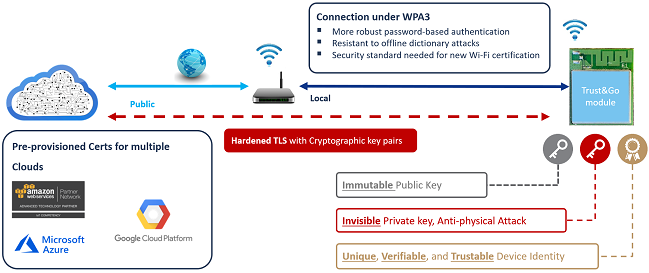
With WPA3 technology, you can choose a simple and easy-to-remember password for your Wi-Fi network without worrying about attackers stealing it by going word by word from a dictionary. As per the Market Requirements Document, WPA3 certification will become mandatory for all new Wi-Fi certifications beginning July 1, 2020.
The Harmony 3 connectivity stacks provide TCP/IP support for both IPv4 and IPv6. Plus support for 3rd party TLS plug-ins including the WolfSSL TLS stack and Crypto Library.
Using the plug-ins including Eclipse Paho MQTT and WolfSSL MQTT, you can create your own local or cloud server using MQTT protocol.

Block Diagram
PIC32MZ1025W103132 SoC
Block Diagram for 132-Pin QFN Chip
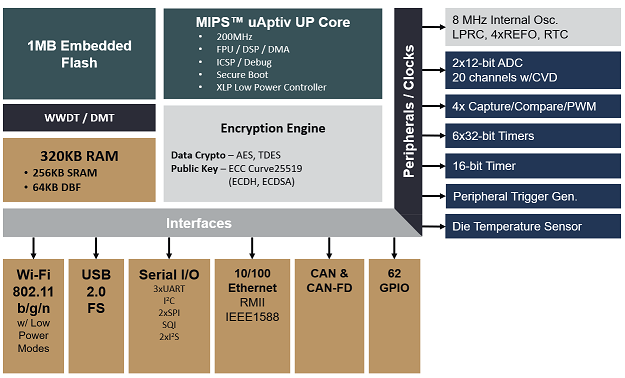
WFI32E01UE Module
Block Diagram for 54-Pad Module
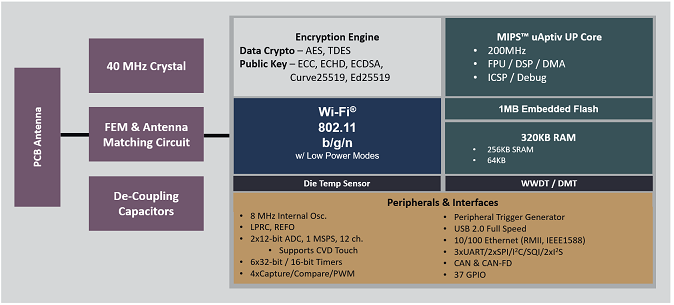
WFI32E01PC Module
Block Diagram for 54-Pad Trust&Go Module
